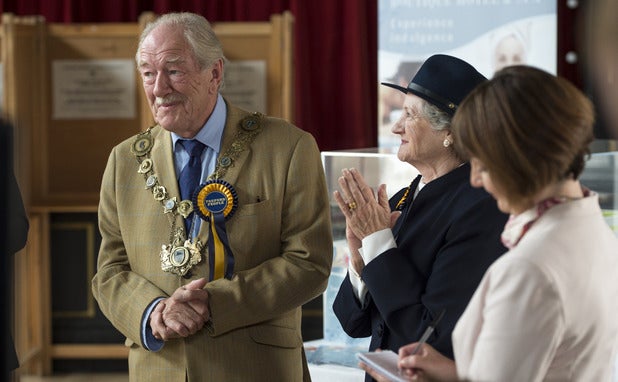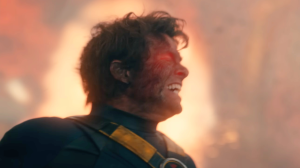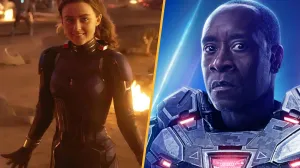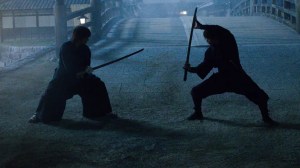Videos by ComicBook.com
Campbell recently took on The Casual Vacancy, a miniseries for HBO based on the novel of the same name by Harry Potter mastermind J.K. Rowling.
Campbell joined ComicBook.com for a discussion on The Casual Vacancy, adapting Rowling and the oddity of doing a serious drama that’s treated as a blockbuster event, with all eyes on every stage of the project.
Television is always really variable. How involved were you in the development of the series?
I came on fairly early on. All that was in place was episode one of three, and that’s when I came on to sort of work with Sarah [Phelps] on collaborating on how the rest of the story would unfold. Obviously she had her own ideas about that, and I’d read the book so I had some ideas and we had lots of meetings about that and mind-wrestling games to sort of navigate our way through this labyrinth of a story, to do what we could to bring it to the screen and do justice to the novel but also sort of reinvent it as a sort of spectacle on television, as well.
It’s a very unusual piece in that respect; it was quite a task to do that. But I was involved with all the casting and all the decisions after that point. Guilty, your honor.
Do you know what went into the decision to make it a miniseries? Obviously that’s not the format that a lot of people expected, since Rowling has had such luck with features.
I think this definitely lends itself more to a television drama, and as such it reaches more people, as well, just because J.K. Rowling is famous for Harry Potter and for her feature films doesn’t mean that this story is best told in a 96-minute, one-off piece.
We always saw it as being one story — one sort of film, if you will, in three acts. With the sheer number of characters, that would be quite tricky in a feature.
For me, I felt like the book had a very deliberate pace that unwinds at a pace that’s necessary to tell the story the way she wants to, so I feel like the format makes a lot of sense. That said, did you feel like you have to tweak things a bit so you’ve got a punch at the end of each episode, so to speak?
I agree that the pacing is very deliberate and the novel requires some effort on the part of the reader, to engage and take time over it.
What I found when I read it is that you have to sort of pause occasionally, just to digest what she’s actually saying. It’s so jam-packed with maxims and very dense observations about human behavior and motivation. It’s thought-provoking, but as such, it’s not like a book that you’d read on a plane and then put it down, pick it up, and not really bother thinking about it while you’re doing it. It requires some thought, I think, and observation, not least because of the number of characters but also because it’s very, very clever.
As a result, three hours to do justice to 500 pages has to take a view about what the essential narrative was going to be. Rather than delve into each individual’s story in too much detail, it had to choose its moments and that will create what I sort of describe as a canvas or a tapestry of that world, much in the same way as when you see a painting, it’s one moment. It captures them at a certain point of the story that serves the purpose of the main story.
So not all of the characters are given center stage, of course, one by one: “Oh, this episode is from this person’s point of view.” It’s about one story and each character plays their part as and when they’re needed and the viewer is left to some extent to fill in some of the gaps and isn’t really told what to think, either. It’s left a bit to their imagination, which leaves some people feeling slightly awkward or like they haven’t got a life raft. They’re being asked to fill in the gaps or form an opinion, rather than it being spoonfed to them.
That’s what actually interested me about the story, is the pacing. Some people say, “Well, it’s slow to get going,” but you try introducing thirty characters. If you get to the point where you can do that and gradually picking up the pace. Any vehicle, when you start off, it has to pick up its momentum. The pacing is deliberate so that as it goes through the three acts, it increases towards its sort of tragic conclusion. You can’t really escape talking about it as a tragicomedy.
So that was also deliberate, and also it was a way of putting people at ease and doing what exactly the piece ultimately won’t do, which is make them comfortable. You start off with a rather dreamy-looking summer in a beautiful setting and gradually as you reveal the characters, each one initially has to be slightly simplistic in the beginning in order to know who people are, but then that cranks up and you realize that all is not what it seems and you recognize character traits hopefully either from yourself or from people that you know.
You touched on a point I wanted to ask about, which is that there isn’t space or time to give everyone resolution. In comic books, everything is a long, interconnected series of never-ending stories, and so we’re kind of used to that. Do you think that’s easier for fans of serialized entertainment to accept than it would be on film?
That’s a really interesting analogy, and an interesting parallel to comics. Often times, “comic book” — and this isn’t an insult, don’t take it the wrong way — as an oversimplification of a character, and actually that’s a load of bollocks because each character in a comic book or a graphic novel serves his purpose at the point they’re needed and then you may not go back to their story.
Equally, it will leave certain storylines deliberately still alive and pulsing and leading you to your own conjecture as to what happens next.
The ending [of the series], one of the big changes that people always hone in on — and it’s very annoying — is this notion of changing the ending, of making it a happy ending or something, which is again a total codswallop. In my opinion, sometimes a lack of clarity about what might happen to a particular character is tantalizingly awkward as an ending and makes me think about it more than if it’s all neatly tied up in a coffin. Death can sometimes be an easy way out, and life itself is where the struggle actually is.
What I’m talking about, obviously, is the character of Robbie and the uncertainty of his fate and the fact that he’ll be thrown into the system, precisely what his sister was doing everything in her power to avoid, is in many ways more tragic if you actually think about it than it is to have a little white coffin and a hearse, which lets everybody off the hook. That was a conscious decision on Sarah’s part to sort of both spare the melodrama of, “Oh, everyone dies at the end,” but also to feed it back into itself, as a seasonal story. As a weather system that keeps on changing over the centuries but keeps on coming the same way over and over again.
The other thing I was going to say about the idea of caricature, of comic book characters, is that had this been a character piece and had they all been wearing wigs and bonnets, nobody would have leveled that kind of comment at the story. It’s only because they’re in contemporary dress. When you meet someone at a party, you don’t have the full lowdown of what their soul is all about, and it’s almost like expecting that to happen straight away.
It sort of fascinates me, the reaction that there’s been. I like reaction; I like people to be talking about it, and I like there to be a difference of opinion because that means you’re not making beige television. But one of the consistent things that everyone seems to be agreeing on — and I find it fascinating and well-deserved — is that the central character that Sarah and I have been focusing on, Crystal’s story, is the one that everyone feels the most warm to. And that’s the point: everyone in that story plays a part in the tragic outcome. That’s their role. The story isn’t about focusing on their individual lives. When people present themselves in public, usually there’s a math there and what we hopefully show is that the public math is often a veneer and the private math is something different, and that each character actually does have a resolution of sorts in my opinion. That’s what I feel about it.
For we U.S. people, who have a simplistic view of English culture, that idea of a public mask is something that I think people will really latch onto — but I liken it more to something like Twin Peaks.
It’s very interesting; I have to say I’ve been incredibly impressed by the level of scrutiny and insight that the reviewers, critics and people writing stories about this have had — far more than the British press, who actually seem — maybe it’s the distance and the perspective and the objectivity that you get from having a slightly different culture and being thousands of miles away, but I think within Britain, people can’t often see beyond their noses. They thought it was about one thing and as you’ve said, it’s actually about human nature and humanity. The veneer is one of the characteristics that you might recognize, as you put it, but it’s actually the lack of compassion and the lack of moral compass is what it’s really about.
It’s about a vacancy, it’s about a lack of something, and that’s quite a difficult premise for people sometimes to grapple with. They’re desperate for a plot, for an action sequence or something, but as J.K. Rowling herself said, character can also be plot.
To your point about it being about a vacancy, I think sometimes people have a hard time seeing that because it’s almost a narrative equivalent of the idea that you can’t prove a negative.
Yes, that’s a really good way of putting it.
People are looking for something and if the thing that they’re looking for is an absence, then they sometimes don’t see it.
Yeah, exactly. And I’m feverishly reading these [articles] because I don’t care whether people like it or not, ultimately, providing I learn something about it myself that will inform me for the future and that it’s well-written and well-observed, however negative.
And often, the tone of some of these pieces betrays who might be writing it. There was one comment which was, “What am I supposed to think at the end?” And I said, “How refreshing that we’re not telling you. You either feel something or you don’t.” That’s not my problem. There are people who think it’s magnificent, there are people who have said, “Oh, well, that’s a load of rubbish,” and being very dismissive of it. So everyone reacts a different way and I do find that fascinating. But the notion that someone feels that, “Oh, hang on, there’s an inconsistent tone here; I’m not quite sure how to react,” it shows that not enough drama does that — that it’s too formulaic and that people aren’t often left to work out some of the conclusions for themselves.
The thing that I always ask people outside of our little sphere is, would you have interest in doing something in comics? Like, “Oh, Rory from Doctor Who is on The Flash now?
You mean like doing a Marvel or something? A live-action version of them, like Karen Gillan went to? Again, I think absolutely. I’m looking to do something that’s out of my comfort zone. Other than Doctor Who, that feels like creating a fantasy world would be a huge challenge, especially with the level of CGI and so on involved — and it would be great fun.
But ultimately whatever genre to me, it would be about “What’s the story?” That story, does it grab me enough to want to spend a year obsessing about it? Is the ultimate story when you get rid of all the action sequences and all the highfaluting graphics, what’s the human story, even if they’re superheroes? That ultimately is the true line that informs you and those are the elements I”m always looking for. I’d love to do something like that, but I’d be looking at a story, rather than, “Oh, I want to do an adaptation of a graphic novel or comic book.”









